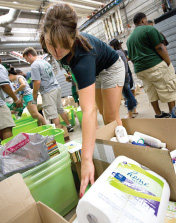Reconnecting Veterans with Civilian Life: The Mission Continues
- Andrea Norton
- Master's student
- Organizational and Community Practice
- School of Social Work
- College of Social Science

Norton's work concentrates on facilitating stronger connections between the MSU community and area veterans.
Andrea Norton arrived on campus in fall 2007 as an eight-and-a-half year Air Force veteran, including a tour of duty in Afghanistan. Norton initially entered James Madison College and began working toward an undergraduate degree in international relations. During a bumpy and sometimes emotional journey, she has developed professional goals that address cultural perceptions about veterans re-entering civilian society and pursuing higher education at colleges and universities across the country.
Since the 2012 spring semester, Norton has been serving a community service fellowship awarded by The Mission Continues, a nonprofit organization dedicated to challenging returning service members to utilize their skills and leadership while renewing their sense of purpose. Norton's work concentrates on facilitating stronger connections between the MSU community and area veterans.
"Female vets are certainly not as common as male vets, and as a group we are either invisible or misunderstood. There was sometimes a vibe of disapproval, a silent judgment that you could detect in someone's demeanor."
Andrea Norton
The fellowship requires Norton to lead a service project in the community, bringing veterans and civilians together for a common effort. Norton worked with Karen McKnight Casey, director of MSU's Center for Service-Learning and Civic Engagement, for the annual Fill the Bus! program held during Fall Welcome.
"The Fill the Bus items collected for personal care, school supplies, and food have immediate and meaningful impacts for mid-Michigan residents. The campaign also provides an opportunity for civilians and veterans to interact on The Mission Continues volunteer team. Veterans work hard, complete assignments with integrity, achieve excellence through extraordinary effort, and take on great challenges with great intensity. We want to continue using the skills and leadership we learned in the military—serving our country and continuing to serve our communities as veterans—to the best of our abilities," aid Norton.
Norton's experiences with MSU administrators, faculty, and students made her aware that not only are there pre-conceived opinions about war, military culture, service men and women, and veterans, but those opinions often homogenize an entire population with diverse ethnic, gender, socioeconomic, and educational representations, as well as situational complexities. "It was a host of things that pretty much brought me to a crisis stage," said Norton. "Female vets are certainly not as common as male vets, and as a group we are either invisible or misunderstood. There was sometimes a vibe of disapproval, a silent judgment that you could detect in someone's demeanor."
Beyond the reactions from others, Norton felt out of place in classrooms with younger students who were just starting their life journey.
"As a member of the Air Force I was used to a great deal of responsibility in the intelligence field, working at a high security clearance level. As a college student I was trying to operate in a world that is often focused on teaching younger individuals who are at the beginning of self-sufficiency, self-awareness, and autonomy. It's a pretty hard transition for a veteran."

MSU student Emily Walsh sorts items donated for Fill the Bus, September 2011.
There are about 300 veterans and members of the armed forces currently enrolled at Michigan State University. Identified through the Registrar's office, the numbers reflect only veterans receiving benefits, omitting those who are teaching, working, training, or in MSU's student system in some other capacity. As others have discovered before her, Norton found that MSU does not offer assigned staff or a permanent location for veterans to connect with each other, find assistance or support, and create a sense of community.
"Until I worked through my own transition issues, I didn't know how to help other veterans. I was desperate to connect with people who might have had similar experiences and could give me insight or helpful suggestions," said Norton. "The work I am doing through The Mission Continues fellowship challenges me to serve others in direct ways and bring other vets into the process."
During her undergraduate work she switched her major to social work, yet credits a James Madison College professor for boosting her resolve to succeed at Michigan State University. "He told the class that he was a veteran," said Norton. "It helped me because he had an approach that incorporated his experiences as a veteran. It was beneficial to learn from someone with a perspective that I am familiar with based on my military career." According to Norton, her social work undergraduate and graduate education has taught her to incorporate a more holistic approach into her work, assessing factors that can be barriers and creating achievable steps for success.
Norton hopes that the fellowship leads to other endeavors. She talks about the need for a permanent MSU veteran services staffer who can look at issues on a full-time basis, and has launched plans for a military culture and veteran awareness program, modeled after the MSU LBGT Resource Center's SafeZone.
"I was frustrated by the slow rate of change, and The Mission Continues fellowship was a catalyst for me to begin really doing what I'm meant to do," said Norton. "I want to improve cultural awareness and sensitivity about veterans and the issues we face at MSU and on campuses across the country."
- Written by Carla J. Hills, University Outreach and Engagement